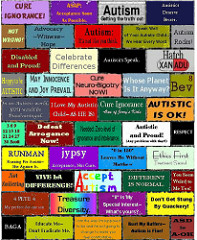A horrifying news story: a little boy in Florida kindergarten class was publicly humiliated and ostracized by his classmates, at the urging of their teacher.
After each classmate was allowed to say what they didn’t like about Barton’s 5-year-old son, Alex, his Morningside Elementary teacher Wendy Portillo said they were going to take a vote, Barton said.
By a 14 to 2 margin, the students voted Alex — who is in the process of being diagnosed with autism — out of the class.
There are so many ways to mistreat those who ought to belong somewhere. These means of intolerance, of expressing prejudice, range from the most passive to the most active. But even the passive ones are cruel when they are intended to be exclusionary. The outright active ones are the most vile.
You can be snubbed, ignored by some of the people in the group. In this case, you are considered to not even be there as a real person worth interacting with. But “just” being snubbed still hurts.
(example: The Glass Box)
You can be shunned, which is being ignored by everyone. This means that: (1) at one point you were part of the group in some small official way, and (2) you should be able to rectify your transgressions and (3) you still have the opportunity to rejoin the group, albeit likely doing so as the lowest caste (again). This is contempt for the Other; the Other must somehow have done something bad, and therefore “deserved” their fate. As the target, you are given the responsibility for the failure to be integrated into the group. It is your fault that you have problems; you just need to “try harder” to fit in and be a fully functioning member of the scholastic social scene. The hidden promise is that if you somehow manage to overcome whatever natural obstacles and artificial hurdles are put in your path, you will be accepted.
(example: Being the Class Project: reflections upon false inclusion)
You can be pitied, where people actually do acknowledge your presence, but still do not consider you to be an equal, much less one of Them. There is a difference between sympathy (compassion) and pity; victims receive pity, but nobody wants to be a victim! Pity creates division and distance between people. By implying inferiority, pity prevents respect. Because you are defined by what you cannot do instead of what you can do, there is a lack of personal worth. The people who see only the “broken” part are uncomfortable with a kind of Schadenfreude, a sense of relief that the bad thing (the disability) did not happen to them. Pity is like magical thinking, where people want to give Fate some kind of token payment to avoid similar disaster from befalling them. Above all, pity is disempowering. It does not decrease burdens by sharing resources and abilities. The “help” given to people often seeks to perpetuate the status quo – the person who is being the helper gets cosmic brownie points. Such “help” is about doing things to people rather than doing things with them; it reinforces power inequalities and objectifies people. It is about maintaining these paradigms rather than empowering people.
(example: Games people play, off and on the court)
You can be bullied, singled out as someone sufficiently weird enough to be outside the group (and thus eligible for being a target because you won’t be protected by others), or because you are sufficiently good enough at what you do to be a threat to the bully’s status with others. Bullies officially operate outside of the officially sanctioned power structures, although the Powers-That-Be will often turn a blind eye to their doings, and either blame the target for the bullying, or pretend that nothing bad is even going on, despite increasing mounds of evidence. Sometimes the official denial, dismissal and displacement of blame are all used simultaneously, which is mindbendingly crazy-making.
(examples: “That Kind” and “I Didn’t Ask For That” and “Tailor-Made” and “No Congratulations Needed”)
And worst of all, you can be outcast, singled out in such a manner that you denigration and ostracism is deemed an appropriate treatment, or even a necessary treatment, by the Powers-That-Be. An outcast is someone who is stigmatized because they have committed some transgression, or are behaving outside the group’s norms. The group collectively shuns you with the goal of either correcting your behavior or of removing you entirely, to protect the collective identity of the in-group.
(example: Odds Are…)
Alex hasn’t been back to school since then, and Barton said he won’t be returning. He starts screaming when she brings him with her to drop off his sibling at school.
Thursday night, his mother heard him saying “I’m not special” over and over. Barton said Alex is reliving the incident. The other students said he was “disgusting” and “annoying,” Barton said.
“He was incredibly upset,” Barton said. “The only friend he has ever made in his life was forced to do this.”
The real problems that must be overcome are not intrinsic to Alex, but are due to the others’ lack of acceptance of him, and of not knowing how to work with him and the difficulties he has, rather than working against him. The usual reasoning goes, If you have problems, it is your fault. Because it is your fault, you should have to deal with the consequences. That sounds reasonable on the surface, but what it really means is that people are often punished for having problems. For example, children become loners not because they cannot be friendly, but because they are rejected as possible playmates.
When the students fail to fit in, the resulting punishment often teaches quite different lessons, not those about how to do school work or play with people, but rather lessons about power. “I’m in charge, so I can make you do what I want,” is the message actually learned. A big problem is that the whole system seems sensible because it’s so entrenched, and because it’s easier to punish the person with problems, than it is to identify and resolve the underlying problems that are causing the distress in the first place. If a student acts up because there is something they cannot do cognitively or physically, then the student is “taught a lesson” by being punished. Naturally, the student then gets even more upset and frustrated and acts out, and then is described a “problem student”. In truth, the student is punished or cast out for “being a problem” but rather for having problems.
(example: The Crime of Punishment)
In television game shows or “reality shows”, the “weakest link” is cast out, leaving each of the successively smaller set of players struggling to become the remaining “winner”. Although there are elimination rounds in sports to find The Winner, education is not a competition. The competition model for education sucks. In such models, there is only one winner, and even that winner must in turn become a loser when they are dethroned by the next winner. In such situations, everyone is ultimately a loser.
In real life, what we want are people who can play and work with others. In real life, we want everyone to win, because winning means that everyone is succeeding in learning the scholastic and social goals.
We do not want to throw away members – we mend the broken links in the chain, to make a stronger and longer chain.
I wish I could give Alex and his family a hug and encouragement. Not everyone in the world is like his teacher Wendy Portillo, and the students to whom she is teaching the wrong messages. I do not need to tell them to be wary, because a great many people believe that such intolerance is so worth fighting for. But I want them to not be afraid — in reality, there are NO outgroups. We are all human beings, endless variations upon a genetic theme.
Captioning / lyrics to YouTube (below) “What the World Needs Now (is love)” as sung by Dionne Warwick
(Hal David/Burt Bacharach)
What the world needs now is love, sweet love
It’s the only thing that there’s just too little of
What the world needs now is love, sweet love
No not just for some but for everyone
Lord we don’t need another mountain
There are mountains and hillsides
Enough to climb
There are oceans and rivers
Enough to cross. enough to last
‘Till the end of time
What the world needs now is love, sweet love
It’s the only thing that there’s just too little of
What the world needs now is love, sweet love
No not just for some but for everyone
Lord we don’t need another meadow
There are corn fields and wheat fields
Enough to grow
There are sun beams and moon beams
Enough to shine
Oh listen Lord if you want to know
What the world needs now is love, sweet love
It’s the only thing that there’s just too little of
What the world needs now is love, sweet love
No not just for some but for everyone
What the world needs now is love, sweet love
What the world needs now is love, sweet love
What the world needs now is love, sweet love








laterain said,
22 June 2008 at 13:20
that happened to me at least twice in elementary school . . . and I wasn’t even diagnosed until I was 25 with ADHD. So to hear you call it “horrifying” is interesting to me . . .
although–there were three of us from my second-grade class in the same psych hospital at age 14. Thank you, Mrs. Franko!
Liesl said,
3 June 2008 at 4:40
Excellent post, Andrea. I loved your comment on Orac’s blog and am happy to see your thoughts expanded here. It’s hard to believe, still, that people are this cruel; yet, I have to counteract the damage done by bad teachers every semester. It’s disheartening.
School “Discipline”? « Andrea’s Buzzing About: said,
3 June 2008 at 3:26
[…] things reached critical mass, including a comment by a tutee, the recent post on Alex Barton (“Mend the Link”), and some internet articles listing “common questions asked in teacher […]
BillK said,
31 May 2008 at 13:27
http://www.cbsnews.com/stories/2008/05/30/earlyshow/living/parenting/main4140155.shtml
http://www.momlogic.com/2008/05/teachers_from_hell.php
http://www.tcpalm.com/news/2008/may/30/michael-goforth-st-lucie-schools-hits-keep-comingg/
BillK said,
31 May 2008 at 11:11
http://www.slate.com/id/2192480/entry/0/
Whitterer on Autism » Blog Archive » Alex Barton said,
26 May 2008 at 2:01
[…] http://www.alongthespectrum.com/2008/05/and-a-new-goat/ https://qw88nb88.wordpress.com/2008/05/25/mend-the-link/ http://www.foggyrock.com/Blog/ViewAllBlogReplies/274 […]
The Golden Rule « Odd One Out said,
25 May 2008 at 19:27
[…] http://www.alongthespectrum.com/2008/05/and-a-new-goat/ https://qw88nb88.wordpress.com/2008/05/25/mend-the-link/ http://www.foggyrock.com/Blog/ViewAllBlogReplies/274 […]